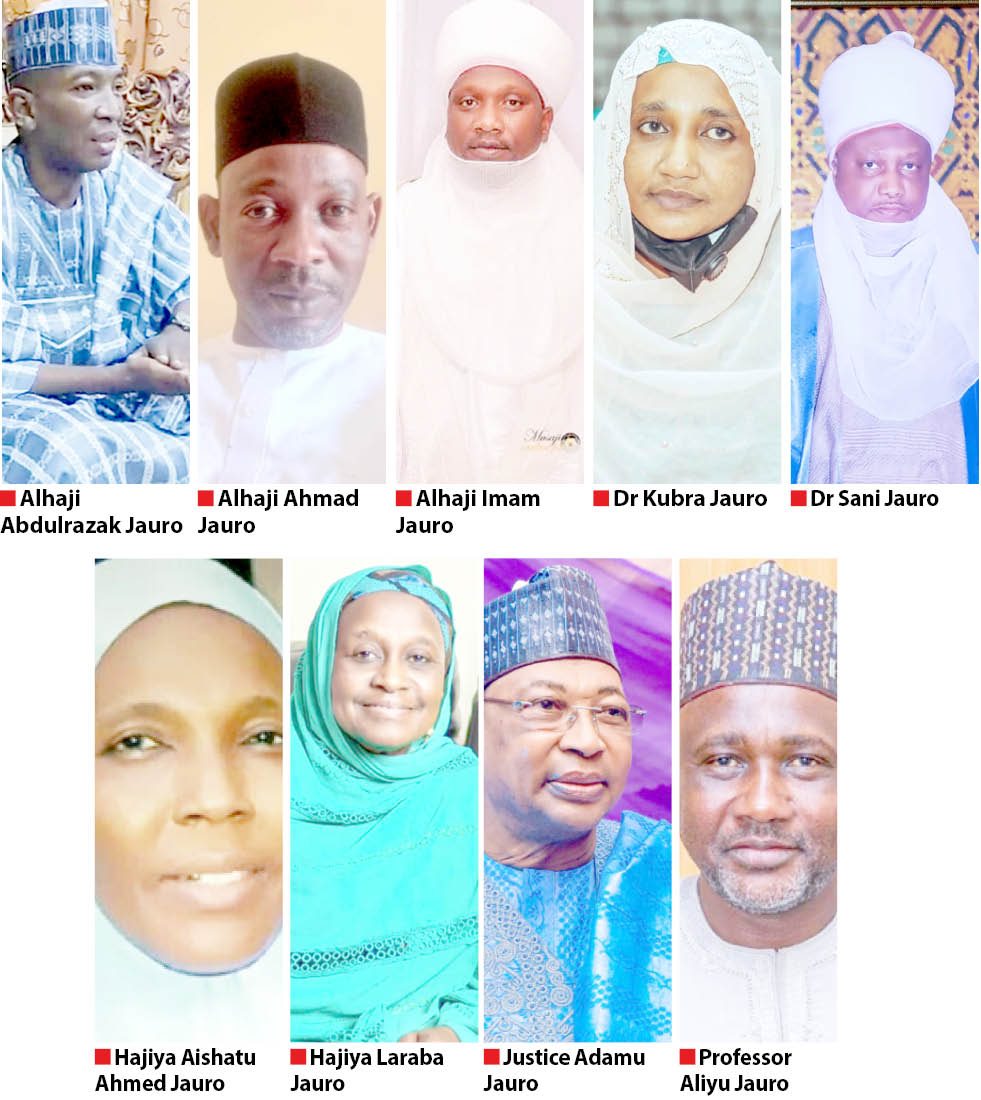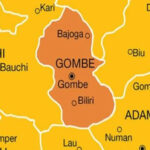A family that produced the first Indigenous headmaster of Gombe Central Primary School, Gombe, two high court judges, a supreme court judge, a kingmaker, the founder of the first private university in Gombe, produced at least two female PhD holders and a professor, could arguably be described as a learned family.
The family of the late Malam Jauro Gombe, the first Dan Lawan of Gombe, (who lived between 1913 to 1988) is one such family. The patriarch of the family, the late Malam Jauro Gombe, Dan Lawan was the first indigenous headmaster of Gombe Central Primary School. His first son, late Justice Abubakar Jauro was among the kingmakers who selected the present Emir of Gombe, Alhaji Abubakar Shehu Abubakar III; his second son, Justice Adamu Jauro, is the first Supreme Court Judge from Gombe State, while his fifth son, Dr Sani Jauro is the founder of the first private university in the state.
The late Malam Jauro Gombe, the Dan Lawan Gombe, was a teacher, a headmaster, a school manager, a politician, a member of the Gombe Emirate Council, and a member of the House of Representatives before independence, as well as a member of the Regional House of Assembly in Kaduna pre-independence.
According to his fifth son, Dr Sani Jauro, the late Malam Jauro was born in 1913 in Gombe Abba, a town established by the founder of Gombe Emirate, the late Malam Bubayero, the first headquarters of Gombe Emirate. Young Jauro moved with his parents when the headquarters on the orders of the colonialists the emirate was shifted from Gombe-Abba to Nafada town.
- My Last Column in the Daily Trust
- A disempowered currency in flames: the fall of the Nigerian naira and the bruising effects
“During the establishment of present-day Gombe, his father, Malam Abdullahi, was the one who represented the emirate. The people of Gombe were made to move to the centre of the emirate, and present-day Gombe City was located at the centre during the colonial period. That was around 1918. At that time, my father was five years old. His father, Malam Abdullahi, popularly known as Makama Abare, was the one who headed the delegation on behalf of the emirate.
“He led a team of scholars and trusted people of the emir to go and site the palace, do all that was necessary, and read the Qur’an for the place to flourish. He was a learned person in the Islamic sciences. His house was the first to be built because he was the leader of the delegation on the part of the emirate. His plot was the first to be allocated by the administration of the colonial system; then the rest of the plots were allocated, and then the emir’s house was built. Afterwards, the people of Gombe moved. The rest of the people built their houses, and that was how Gombe was established. At that time, my father was five years old. He was five years older than the present-day Gombe,” Dr Jauro said.
He added that their grandfather lived and served seven emirs of Gombe, from Emir Sulaiman until his demise during the reign of Emir Haruna.
“Our grandfather was appointed Makaman Gombe by the Emir of Gombe Zailani. Makama Abdullahi Abare was a scholar. He went to study in Bama in present-day Borno State, before a teacher who was called Sheikh Ari-Kau. It was reported that the man, Arikau, had also studied with Malam Bubayero in Borno, therefore, Bubayero was his colleague. After having studied with Arikau, Arikau decided that our grandfather, should go to Gombe and study before Bubayero. But when he went to Gombe-Abba, Bubayero passed on that year, and his son Emir Sulaiman succeeded him, and wanted him to stay with him because he knew the teacher who sent him, so he kept him. He survived all the emirs of Gombe except Emir Abubakar. He died during Haruna because he was said to have lived for more than 120 years,” Sani Jauro narrated.
Malam Jauro attended elementary school in Gombe. His teacher, Malam Audu Ibbi, was from Bauchi. He came and established Central Primary School in 1924. Some of the people he attended school with are Maina Yuguda (Dan Buram Gombe) and a prince of Gombe Emirate. After elementary school in Gombe, he went to Bauchi Middle School.
Dr Sani Jauro said his father told him that during that time, they used to trek from Gombe to Bauchi to go to school. “Earlier on, they were given horses and riders to take them, but because of the incidents of tsetse fly killing the horses, they stopped giving them horses, so they had to trek from Gombe to Bauchi.
“There were no cars. Even if there were cars, they belonged only to the colonial masters. He came back after Bauchi Middle School and was sent to establish Central Primary School in Bajoga, the northeastern part of Gombe around 1935 or so. The school took off, and it was very successful. After two years, Malam Abdullahi Ibbi was retiring, and he recommended Malam Jauro to take over from him at Central Primary School Gombe. At that time, Central Primary School was the pioneer school in Gombe and the most populous at that time, and they didn’t want the school to decline. He was transferred to be headmaster of Central Primary School, Gombe.
“We can say that he was the first Indigenous headmaster because the other person was from Bauchi. He was headmaster for a few years and later promoted to a visiting teacher and school manager in the Gombe division, covering what is Gombe State today. A visiting teacher and school manager is just like a commissioner of education today. He tours the state every two weeks of the month, either on bicycle, on foot, or on horseback. He goes around the schools to check the lesson notes and lesson plans to make sure the teachers are teaching correctly and the pupils are attending classes. He approached the emir about those who were not attending classes so that their parents would be invited and force them to go to school. At times, he will go to their parents and convince them to re-enrol their children in school.”
He also had a stint in politics, he was a member of the House of Assembly in Kaduna and the House of Representatives in Lagos, but he was later told to relinquish the one in Lagos, and he served in Kaduna for some time at the regional assembly. He was in politics for some time and was elected.
“After independence, he served at the local level as a member of the emirate council, of which the emir was the chairman at the time of the native authority. Under the native authority, he was a senior councillor and counsellor for education and health for quite some time. At some point, he was the chairman of Gombe Local Government, and he brought about a lot of reforms before retiring from service. He served on many committees in the North Eastern States and later Bauchi State. He was a part-time member of the Bauchi State Civil Service.
“However, sometime in September 1988, on his way back from attending one of the meetings in Bauchi, he had an accident, and he lost his life. He was 75 years old at the time,” he said.
Although Malam Jauro’s real name was Adamu, he was popularly known as Jauro, a Fulani name generated from a Fulfulde phrase, ‘Jaumuwuro,’ meaning owner of a house or hamlet. Fulanis settle in Hamlets.
“The head of a household, or Hamlet, is called ‘Jaumuwuro.’ Over time, the original sounds disappear, and the first and last will come together to form a word. That is where you have Jauro. He was probably named after one Jauro and he used Jauro Gombe as his official name throughout his lifetime.
“My father grew up with the late Emir of Gombe, Malam Abubakar Umar (1936-1984), they grew up together, but I don’t know if they went to school together. Due to the advantage of Western education and the trust between them, that was the secret behind their close friendship. Malam Jauro, even though he is my father and I am not supposed to praise him, people said he was an upright man, very honest and brave. He spoke truth to power. He was about the only adviser who could tell the emir the truth, no matter how bitter it was. That was also the character of his father, Makama Abdullahi Abare. That was also the secret of his father’s closeness to the emirs of that time.
“Although his father was Makaman Gombe, he held the title of Dan Lawan, because he was young when his father died and the title moved around.
“However, when he was old enough to take a title, the Makama title was with somebody else, so he took the title of Dan Lawan, and was already a council member. Titles are just names; it is the occupants of the title that will make the title great. At the time, Makama Abare had raised the title to a very high level, to the extent that nobody was above him at that time because of his bravery at war, his honesty, and his scholarship. These gave him an advantage. When the title moved to other places, perhaps it declined. When he was to take a title, Emir Abubakar conferred the title of Dan Lawan on him. Dan Lawan is a title for the children of the royal family,” Dr Jauro explained.
Although the late Malam Jauro’s father was an Islamic Scholar, he did not take Islamic scholarship as his main calling, “but he was learned and could read anywhere in the Qur’an. I don’t know whether he memorised the whole Qur’an, but he could read some of the chapters from his head. He also taught us the Qur’an when we were young, but did not take it as his primary calling.”
Sani Jauro stated that the late Jauro Dan Lawan didn’t have children early. “In fact, his first child, who survived him, was born by his last wife.”
At the time of his death in 1988 at the age of 75, late Malam Jauro left behind four wives and 11 children. All of Dan Lawan’s children have established themselves in both the public and private sectors in Nigeria.
His first child was the late Justice Abubakar Jauro, who was a Justice of the state high court. He was company secretary and legal adviser at the Savannah Sugar Refinery in Numan, Adamawa State before he was appointed a high court judge in Gombe State. He died in August 2021 shortly after he retired from the Gombe State Judiciary.
His second son, another lawyer is Justice Adamu Jauro, he was a high court judge in Gombe, like his elder brother, before his elevation to the Court of Appeal and subsequently to the Supreme Court, making him the first Justice of the Supreme Court of Nigeria from Gombe State. The third son in the family, Alhaji Abdulrazak Jauro also worked in the judiciary and retired on May 7th, 2024 from the Judicial Service Commission.
The first daughter Hajiya Aishatu Laraba Jauro, is a graduate of Islamic Studies and married to Alhaji Auwal Shehu. She has six children; three females and three males. All of them are university graduates.
Dr Sani Jauro is the fifth child of the family, he has both a Bachelor’s and Master’s degree in English, a Master’s in Public Administration, and a PhD in Public Administration. He was a lecturer at the University of Maiduguri and subsequently joined the Gombe State Civil Service, where he rose through the ranks to the prestigious position of Permanent Secretary and Principal Private Secretary (PPS) to former Governors Danjuma Goje and Ibrahim Hassan Dankwambo (2007 to 2019). He is the founder of the first private university in Gombe, the North-Eastern University, Gombe (formerly, Pen Resource University, Gombe).
Malama Aishatu Jauro is well-learned in Islamic Studies and is a preacher. Then Professor Aliyu Jauro, a Professor of Chemistry and lecturer with the Abubakar Tafawa Balewa University (ATBU), Bauchi. He is the immediate past Director-General of the National Environmental Standards and Regulations Enforcement Agency (NESREA). The eighth child in the family, Dr Kubra Jauro had a PhD in Agricultural Economics. She is working with the National Board for Technical Education (NBTE), Kaduna.
Ahmad Jauro has both a Bachelor’s and Master’s degree in Sociology, he currently works with the Nigeria Social Insurance Trust Fund (NSITF). Imam Jauro also holds a Bachelor’s degree in Sociology and a Master’s degree in Criminology and works with one of the security agencies. Dr Fatsuma Jauro has a PhD in Computer Science and is a lecturer with the Ahmadu Bello University (ABU), Zaria.
In what could be said to be a confirmation of their status as a learned family, 10 of the 11 children left behind by late Malam Jauro, had at least a Master’s degree.
Dr Jauro said they have fulfilled the wish of their father, which is the dream of almost every teacher, for his children to reach the highest level in academic pursuits.
“That has been his dream, and this is the kind of orientation he gave us. He kept pushing us to study. His greatest wish was for us to study and be independent. Alhamdulillah, most of us are doing great, and if our father were alive today, he would have established a university if he had the means.”
Despite the size of the family, there is cordial relationship among them, Dr Jauro explained the reason.
“It is the way our father trained us. He made sure we were united under our elder brother. He inculcated the discipline of respect to the elderly. The unity is due to the efforts of our fathers and also our mothers. When Justice Abubakar Jauro was alive, if he drew a line and said nobody would cross it, nobody dared to cross it. Now that Justice Adamu Jauro is the leader of the family, whatever he says is final. We all follow his orders without derailment,” he said.

 Join Daily Trust WhatsApp Community For Quick Access To News and Happenings Around You.
Join Daily Trust WhatsApp Community For Quick Access To News and Happenings Around You.


